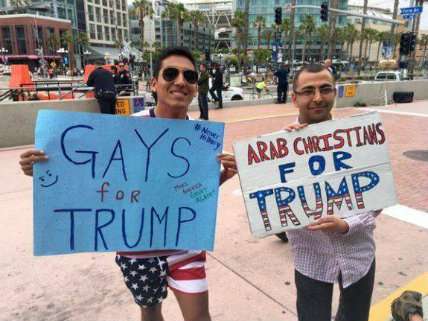Trump Fans, Progressives, and Homeless Advocates Unite to Sue the City of Cleveland
Rules related to the upcoming Republican National Convention "have an absurdly wide reach and cannot be justified in any rational way," states their lawsuit.

Conservative, progressive, and non-partisan activists are teaming up to sue the city of Cleveland over regulations related to the upcoming Republican National Convention. On Tuesday, the American Civil Liberties Union (ACLU) of Ohio filed a federal lawsuit on behalf of Citizens for Trump, Organize Ohio, and the Northeast Ohio Coalition for the Homeless, alleging that Cleveland's restrictions on speech, assembly, and movement during the July convention are unconstitutional.
"The nominating convention of one of our country's two major political parties presents a significant opportunity for individuals and organizations to participate in the democratic process through the exercise of their rights of free speech and assembly," states the lawsuit, noting that the convention is expected to host 2,472 delegates, 15,000 members of the media, and many major GOP donors and lobbyists. "It will thus provide an opportunity for groups and individuals to voice their opinions directly to the leaders and decision-makers of the Republican Party, to national and international media, and to people across the country and around the world who will watch Convention coverage."
Well, it could provide that opportunity, anyway. But not with the regulations that Cleveland has put in place. Per the city's orders, demonstrators will basically be relegated to small free-speech zones out of sight or shouting distance from where the convention actually takes place. These zones include:
- A "parade route" where permitted activist groups can march during select hours. "Parade participants will spend three-fourths of their time traversing a bridge, sequestered physically from any potential bystanders, and considerably beyond the seeing and hearing range of delegates and other convention goers," the ACLU notes. What's more, each group is limited to one 50-minute slot during the 114-hour convention period, and only 18 hours total have been allotted for such demonstrations. Plus, these allotted parade times "have no overlap with the time periods in which delegates will attend convention activities."
- Two small public parks, also a distance from the convention, in which the city will grant 18 temporary permits for "public art" or "public installations."
- One speaker's platform, located in a public square, during which activists can apply for 30-minute speaking slots. "Use of this sole platform is limited to … hours that have limited overlap with the times during which the Convention will actually be in session," according to the ACLU.
So far, the city hasn't issued a single permit these activities, even though the convention is a month away and some groups turned in their applications four months ago.
"As the Convention rapidly approaches, the City's delay makes it increasingly likely that applicants like Citizens for Trump and Organize Ohio that are planning marches or rallies involving three to five thousand participants will lack sufficient time to complete critical logistical arrangements," the ACLU notes. "The City's inaction is a constructive denial of the permits, and a prior restraint of this First Amendment activity."
The lawsuit asks the court to force immediate action on the permit applications and to reconsider the hours and spaces permitted for demonstrations. Currently, the "severe limits imposed by the City on the rights of the people to freely assemble and to express their political and other views are arbitrary, unduly restrictive, and without rational justification," it asserts.
Meanwhile, the specified "event zone" for the convention is as expansive as the demonstration rules are restrictive. Throughout the convention period, a 3.3 square-mile stretch of downtown Cleveland—an area containing numerous residences, businesses, and Cleveland State University—will be classified as the event zone and subject to special rules. For instance, no one is permitted to set up any "object to make a public speech"—i.e., the proverbial soapbox—or to use any sound-amplification equipment, such as a megaphone, within the zone.
A host of everyday items are also considered contraband within the event zone. These include rope, tape, coolers, large backpacks, tents, umbrellas, canned goods, aerosol cans, and tennis balls. "Lamentably, many homeless people live within the Event Zone's very large radius and are especially vulnerable to the Regulations' draconian reach," the ACLU states.
By designating many of their basic, everyday necessities as contraband, and drawing an unreasonably wide zone for enforcement, the City is subjecting its homeless residents to unnecessary encounters with the police, and interfering with their rights to liberty, privacy and movement.
The regulations will also mean that students using the Cleveland State tennis courts will be scofflaws, as will any student or neighborhood resident who happens to purchase some hairspray or canned peas over the course of the convention period. Such rules, says the ACLU, "have an absurdly wide reach and cannot be justified in any rational way."


Show Comments (44)